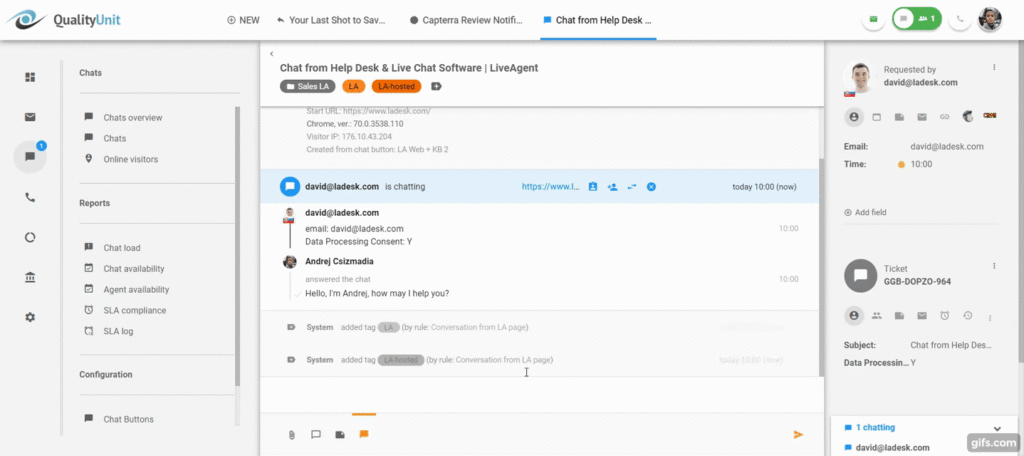- All checklists
- Customer Service
- Customer service skills checklist
Customer service skills checklist
Checklist of essential customer service skills including communication, empathy, problem-solving, attitude, time management, goal-orientation, and product knowledge, with practical tips and tools for improvement. Suitable for business owners, customer service agents, team leaders, and anyone who wants to provide superior customer support and increase customer loyalty.

- Speaking skills
- Empathy
- Self-control
- Active listening
- Clear communication skills
- Writing skills
- Ability to use positive language
- Problem-solving skills
- Positive attitude
- Adaptability and flexibility
- Patience
- Emotional intelligence
- Time management skills
- Desire to improve
- Product and service knowledge
- Ability to read customers
- Goal-orientation
- Confidence
Customer Service
Customer Service Standards
Customer Service Quality Assurance
Customer Complaint Handling
Customer Service Evaluation
Help Desk Quality Assurance
VoIP Implementation
Customer Service Audit
IT Help Desk Audit
Help Desk
Customer Service Call Quality
Customer Service Agents Training
New Client Onboarding
Know Your Customer
SaaS Customer Onboarding
No matter the industry you work in, providing excellent customer service is essential to your success. We will provide a checklist of the essential customer service skills that every business should strive to master. These skills will help you deliver superior support and increase customer loyalty.
The importance of a customer service skills checklist
With so much competition in every industry, it’s more important than ever to make sure your customers feel valued and appreciated.
A checklist is a great way to ensure that you don’t forget about any of the essential customer service skills. It can be also helpful for onboarding new customer service employees or for training purposes.
For many, connecting with people and providing excellent customer service is a natural instinct, but for others, it may take some time and practice. And here’s where a customer service skills checklist comes in handy, giving you a guide to follow so that you don’t miss any details.
Who can benefit from a customer service skills checklist?
- business owners
Make sure that your customer service skills are up to par. After all, you are the face of your company. A customer service skills checklist can help you identify any areas where you and your team need improvement.
- customer service agents
As a customer service agent, your job is to make sure that your customers are happy. You will need to have excellent communication skills and the ability to stay calm under pressure. You should also be able to problem-solve and think on your feet.
To help you out with all your duties and responsibilities, we have compiled numerous service desk template examples that will ensure each customer interaction is a success.
- team leaders
Being a team leader, it’s your responsibility to oversee that your team provides excellent customer service. You will need to set an example and provide training for your customer service team members. A customer service skills checklist can help you do just that.
Explore our customer service skills checklist
The ability to communicate clearly and effectively is one of the most important customer service skills.
Why is it important to have speaking skills?
They help you communicate better. This is especially important in business, where clear communication is key. Speaking skills can also help you build relationships and networks, which can help advance your career.

How to improve your speaking skills?
Identifying your weaknesses should be the first step. What are you struggling with when it comes to speaking? Do you have a hard time making eye contact? Are you shy and uncomfortable talking in front of people?
Once you understand the things you need to work on, you can start practicing. A good way to improve your speaking skills is to find opportunities for public speaking. You should also get feedback from others.
Which tools to use for improving speaking skills?
- TED talks
- books on public speaking
- classes and coaches
Empathy is the ability to understand and share the feelings of others, so it is an essential ingredient in providing excellent customer service.
Why is empathy important in customer service?
It’s crucial to be able to empathize with your customers because doing so shows that you care about their experiences. When you can empathize with someone, it helps to build trust and rapport. Empathy can help you resolve conflicts and understand the needs of your customers.
How can you be more empathetic?
Simply try to put yourself in your customer’s shoes. What are they going through? What are their needs and wants? Once you’ve answered these questions, it will be easier to understand their point of view.
Which tools can you use for being more empathetic?
- customer service training
- psychology books/seminars
- empathy exercises
- role-playing
One of the most required customer service skills is the ability to stay calm under pressure.
Why is self-control important in customer service?
When you’re dealing with people, there’s always a chance that something will frustrate you. Be sure that you can handle the situation calmly.
How can you build self-control?
Identify your triggers. What sets you off and makes you lose your temper? Once you know what these triggers are, you can work on avoiding them or dealing with them in a more controlled manner.
Which tools can you use for having self-control?
- crisis management procedures
- stress management techniques
- training on how to deal with difficult customers
- self-monitoring tools (such as a journal)
- timeout/space
Active listening is the process of paying close attention to what someone is saying and responding appropriately.
Why is active listening important in customer service?
It shows that you care about your customers and their experiences. With active listening, you’re able to understand the needs of your clients and provide them with better service.
How can you improve your active listening?
Always pay attention to what the other person is saying by making eye contact, not interrupting, and trying to understand what they are saying. Paraphrase what you’ve heard to ensure that you understand correctly and show the other person that you’re listening closely.
Which tools can you use for listening actively?
- customer service training
- active listening exercises
- listening skills assessments
With clear communication skills, agents can be more productive and satisfied with their results.
Why are clear communication skills important in customer service?
Communicating with customers requires being clear so that there are no misunderstandings. Being able to communicate effectively shows that you’re confident and competent, which can impact customer loyalty.
How can you communicate clearly?
Observe your tone of voice – is it respectful and professional? Use clear and concise language, and avoid using jargon or slang that could be confusing for the customer. Another tip is to slow down your speech so that they can understand you better.
Which tools can you use for communicating clearly?
- customer service training
- communication skills assessment
- language training (if necessary)
- telephone etiquette training
Exceptional writing skills are required to communicate clearly and accurately with customers via typed messages.
Why are writing skills important in customer service?
Your communication with customers should be precise and easy to understand. This means taking the time to correctly spell words and use proper grammar.
How can you improve your writing skills?
Make sure that you proofread all of your communications with customers before sending them.
Which tools can you use for improving your writing skills?
- customer service training
- writing skills assessment
- grammar and spelling checkers/classes
- editing and proofreading services
With positive language, customer service agents can create a more positive experience for the customer.
Why is the ability to use positive language important in customer service?
Using positive language shows that you’re friendly and helpful. It also makes customers feel more comfortable and encourage them to continue doing business with you.
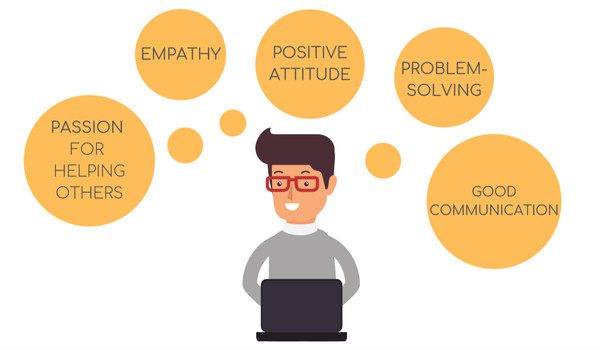
How can you use positive language?
Make a conscious effort to avoid negativity when speaking with customers. For example, instead of saying “I’m sorry for the inconvenience,” you could say “Thank you for your patience.” Try to avoid negative words like “no” or “can’t“.
Which tools can you use for improving your ability to use positive language?
- customer service training
- positive language assessment
- empathy training
With problem-solving skills, getting to the root of customer issues is possible.
Why are problem-solving skills important in customer service?
Problem-solving skills allow agents to identify and solve customer issues quickly and efficiently. They can help minimize the impact of an issue on the customer and improve their satisfaction.

How can you improve your problem-solving skills?
When faced with a customer issue, take the time to ask questions and understand the root of the problem. This will allow you to come up with a solution that is effective and satisfies the customer. You can also practice problem-solving scenarios with your team.
Which tools can you use for improving your problem-solving skills?
- customer service training
- problem-solving assessment
- troubleshooting guides
- technology support (help desk software e.g. LiveAgent)
For a customer service agent, the key is not only to have a positive attitude when providing excellent customer service but to actually being satisfied and happy in their jobs.
Why is a positive attitude important in customer service?
Your attitude can have a big impact on the way you interact with customers. If you’re friendly and upbeat, it will put the customer at ease. A positive attitude can make your job more enjoyable and prevent burnout which is important in this sector.
How can you improve your attitude?
You can start by taking a few deep breaths and smiling. This may seem like a small thing, but it can help change your mindset and improve your mood. Try to find the positives in every customer service interaction, even the difficult ones. Take some time for yourself outside of work to relax and recharge.
Which tools can you use for improving your attitude?
- customer service training
- attitude assessment
- positivity training
- self-care
While some customer service issues are easy to resolve, others can be more complicated. Customer service agents should be adaptable and flexible in their approach.
Why are adaptability and flexibility important in customer service?
Customer support agents need to be able to adjust their approach based on the customer’s needs. This may mean being able to handle difficult customers or multiple tasks at once.
How can you be adaptable and flexible?
Nothing works here better than practicing handling different types of customer issues. This will help you to be better prepared for anything that comes up. Try to stay calm when things don’t go as planned.
Which tools can you use for being adaptable and flexible?
- adaptability assessment
- flexibility training
- task management tools
In many cases, customers may not have a clear understanding of the issues they are facing or how to resolve them. Customer service agents need to be patient when explaining the solution and helping the customer through the process.
Why is patience important in customer service?
It allows agents to take their time with customers, ensuring that they understand the issue and the solution. It also prevents them from getting frustrated with customers, which can lead to providing poor service.

How can you have more patience?
Practice active listening skills and empathy. Understanding the customer’s needs means paying attention to what they are saying. Try not to rush through customer interactions.
Which tools can you use for having more patience?
- talk scripts
- knowledge base
- listening skills assessment
- stress management tips
Reading the emotions of others is often an underappreciated skill among customer service agents.
Why is emotional intelligence important in customer service?
It allows agents to better understand the customer’s needs and how to resolve their issues. It also helps them to remain calm in difficult situations and prevent themselves from becoming angry or frustrated with customers.
How can you improve your emotional intelligence?
Try to take a step back from customer interactions and understand their emotions. Put yourself in their shoes and understand their situation.
Which tools can you use for improving your emotional intelligence?
- empathy training
- emotional intelligence assessment
- anger management tips
Customer service agents need to be able to manage their time effectively, especially when dealing with multiple requests.
Why are time management skills important in customer service?
They allow agents to handle more than one customer interaction at a time. This prevents customers from having to wait long periods of time for a resolution.
How can you improve your time management skills?
Create a schedule for yourself that outlines when you will be available to take customer calls or respond to emails. Try to stick to this schedule as closely as possible and use time-tracking tools to help you do so. If an issue arises that requires more time than you have, let the customer know and provide them with an estimated resolution time.
It’s also a good idea to invest in help desk software with an advanced ticketing system. By using tools like LiveAgent, agents can be more productive and organize their work more efficiently.
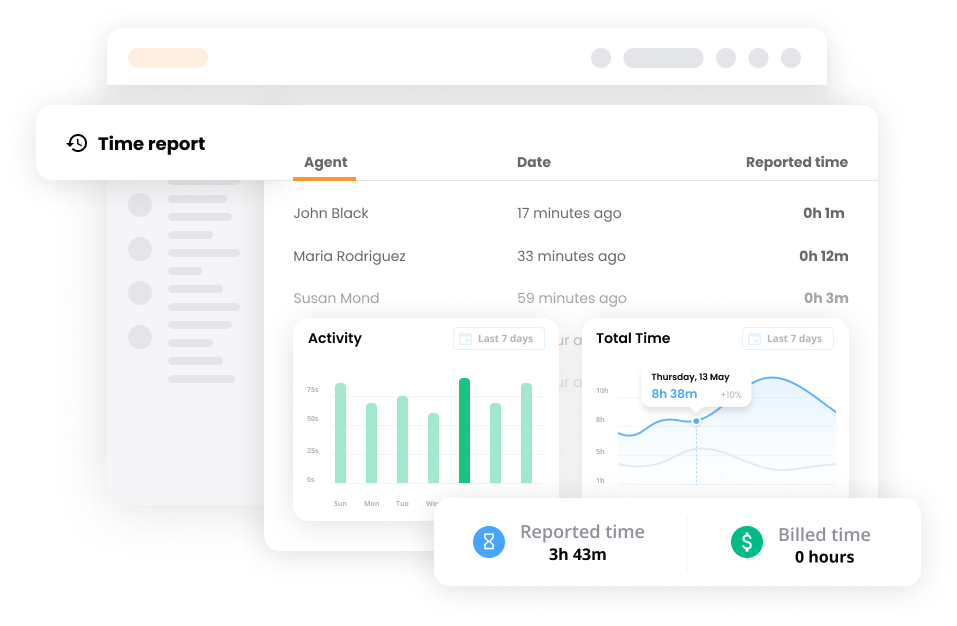
Which tools can you use for improving your time management skills?
- time-tracking software
- to-do list app
- project management software
- all-in-one help desk software, e.g. LiveAgent
No matter how good your customer service skills are, there is always room for improvement.
Why is it important to have a desire to improve?
Customer service agents should never stop learning and growing in their field. Since it is a constantly changing industry in which new technologies and best practices are emerging all the time, agents should always strive to improve.
How can you motivate yourself to improve?
Give yourself honest feedback. Take some time to identify the areas you need to work on and create a plan to improve those skills. Join online communities and forums related to customer service, participate in discussions, and learn from others. Read industry-related articles and blog posts, as well as attend training sessions or workshops whenever possible.
Which tools can you use for having a desire to improve?
- personal development plan
- webinars and podcasts
- learning resources for customer service agents
- customer service training courses and certifications
Customer service agents need to have a good understanding of the products and services they are supporting.
Why is product and service knowledge important in customer service?
If agents do not have a good understanding of the products or services they are supporting, they will not resolve customer issues effectively.
How can you improve your product and service knowledge?
If you are not already familiar with the products or services offered, start by reading through the documentation. Try using the products or services yourself to get a better understanding of how they work.
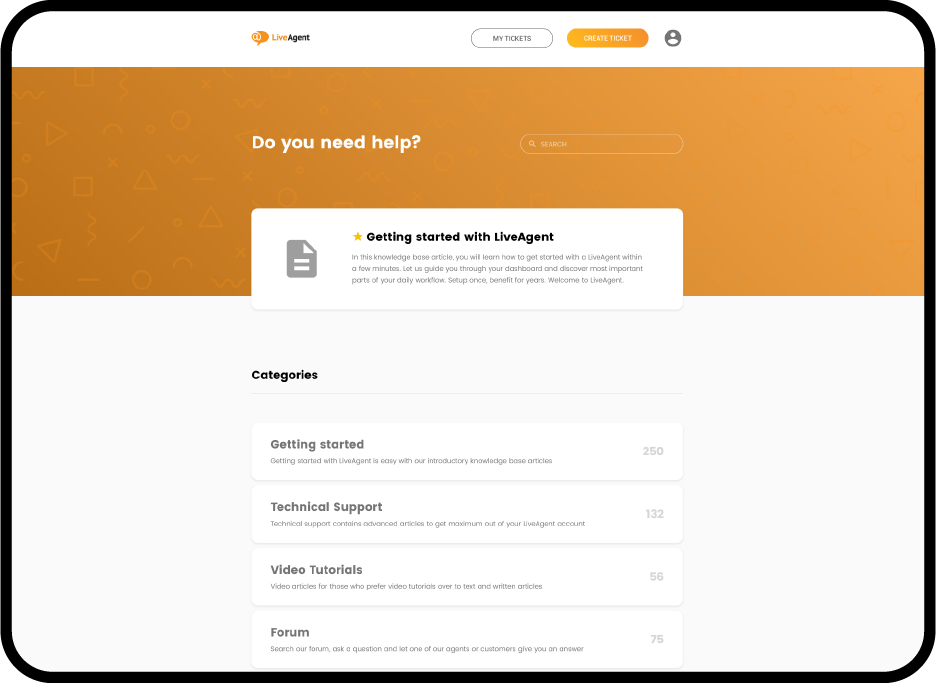
Which tools can you use for improving your product and service knowledge?
- product knowledge base
- training materials
- customer service forums
A key skill that a customer service agent should have is the ability to understand between the lines.
Why is it important to be able to read customers?
Customer service representatives who cannot read people may struggle with delivering clients the best possible experience.
How can you improve your ability to read customers?
The best way to improve your ability to read customers is to be proactive in your client communication. Pay attention to what the customer is saying, both verbally and non-verbally. You can also ask for clarification if needed.
Which tools can you use for improving your ability to read customers?
- client communication training
- feedback forms
- customer satisfaction surveys
Being goal-oriented can help customer service agents stay focused on providing the best customer experience.
Why is goal orientation important for customer service agents?
If agents are not goal-oriented, they may become easily distracted and not be as productive. They may also lose motivation over time if they do not have any goals to work towards.
How can you be goal-oriented?
Set realistic goals for yourself and then work towards achieving them. Track your progress so that you can see how far you have come and what still needs to be done. Celebrate your achievements, no matter how small, to keep yourself motivated.
Which tools can you use for being goal-oriented?
- goal-setting worksheet
- progress tracker
- to-do list
By having confidence, customer service agents can effectively handle customer interactions.
Why is confidence important for customer service agents?
If agents are not confident, they may feel overwhelmed or stressed during customer interactions and come across as hesitant or unsure.
How can you gain confidence?
The best way to improve your confidence is by practicing. Find a friend or family member who can help you role-play different customer service scenarios. If not, try practicing in front of a mirror.
You should also stay up-to-date on industry news and best practices. This way, you will be more prepared when interacting with customers.
Which tools can you use for gaining confidence?
- customer service scenarios
- industry news
- best practice guides
How to develop your customer service skills?
There are many tools and resources that can help you learn and grow.
- Read books and articles
Reading books and articles about customer service can help you understand the different types of customers that you may encounter and how to best accommodate their needs. They can also give you some helpful tips on how to deal with difficult customers and resolve any disputes.
- Watch videos and tutorials
By doing this, you can learn the proper way to deal with customer service complaints and inquiries. You can also learn how to be polite and courteous while addressing customer concerns. Moreover, you can learn about the product and be more confident about your knowledge.
- Attend workshops and training seminars
There are lots of different methods for developing interpersonal skills, but attending workshops or seminars is one great way. They offer a more structured learning environment than just reading articles or watching videos online. Plus, you get to learn from experts who have years of experience in the field.
Attending training can help you learn how to deal with difficult customers, handle complaints, and provide excellent customer service. You’ll also learn about the latest trends and techniques in customer service, so you can stay ahead of the curve.
- Volunteer or intern in a customer service role
Working as a volunteer or intern in customer service can help you develop skills by giving you hands-on experience dealing with clients. It can also help you build your network of contacts in the industry.
- Practice writing emails, making phone calls, and handling complaints from customers
When you’re writing, you’re forced to express yourself clearly. You also have to pay attention to detail – accuracy and precision are key when providing customer service.
By making customer calls, you can develop your customer service skills by gaining experience speaking to clients and addressing their concerns. Furthermore, ask customers for feedback on your performance so that you can continue to improve.
- Ask friends, family members, and co-workers for feedback on your customer service skills
By getting customer feedback, you identify areas for improvement and learn how to better meet your clients’ needs.
When asking for feedback, be sure to ask specific questions about the customer’s experience and avoid making assumptions. Be patient and give customers time to provide a detailed response. Thank them for their input and act upon the feedback they provide.
- Participate in customer service courses
There are many different courses and programs available that can help you develop customer service skills. These courses and programs can be found at colleges, universities, and training institutes.
The topics covered in customer service courses and programs vary, but they typically include communication skills, problem-solving techniques, conflict resolution strategies, product knowledge, and dealing with difficult customers.
Summary of the customer service skills checklist
- Speaking skills
- Empathy
- Self-control
- Active listening
- Clear communication skills
- Writing skills
- Ability to use positive language
- Problem-solving skills
- Positive attitude
- Adaptability and flexibility
- Patience
- Emotional intelligence
- Time management skills
- Desire to improve
- Product and service knowledge
- Ability to read customers
- Goal-orientation
- Confidence
Frequently Asked Questions
What are the principles of good customer service?
The first is to always be polite and courteous to your customers, no matter what. The second is to always try to resolve any issue the customer is facing as quickly as possible. And the third is to always be responsive to customer feedback and take measures to improve your service based on that feedback.
Why do soft skills matter in customer service?
Soft skills help create connections with customers. This, in turn, can make them more likely to return or refer others. Furthermore, soft skills help create a positive image of the company. Customer service representatives who have good soft skills can represent the company in a positive light and make clients feel appreciated.
Why is customer service important?
It’s one of the main ways in which businesses connect with their clients. Good customer service can create loyalty among clients and encourage them to return in the future. It also helps businesses identify and resolve issues. This improves customer satisfaction and prevents negative word-of-mouth marketing. Finally, good customer service can increase sales by providing an additional avenue for clients to purchase products or services.
What if someone on your team is lacking these skills?
It’s important to first assess why this might be the case. Perhaps they’re shy and don’t feel comfortable speaking with customers, or maybe they’re not very knowledgeable about the product and feel overwhelmed. In any case, it’s important to provide training and support to help that team member improve their skills in customer service. You might want to start by providing some helpful resources, like a customer service training guide or video tutorials. And then you can set up some mock customer interactions so that team members can practice their skills in a safe environment.
What are the 10 key customer service skills?
We listed more skills above, but the top ten customer service skills include: Patience EmpathyCommunicationProblem-solvingFlexibilityOrganizationMulti-taskingStress managementConfidencePeople skills
You will be
in Good Hands!
Join our community of happy clients and provide excellent customer support with LiveAgent.

Our website uses cookies. By continuing we assume your permission to deploy cookies as detailed in our privacy and cookies policy.
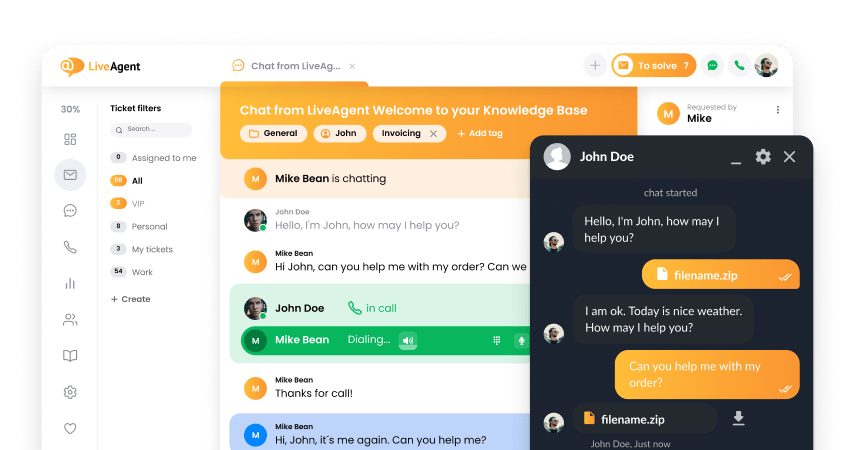
- How to achieve your business goals with LiveAgent
- Tour of the LiveAgent so you can get an idea of how it works
- Answers to any questions you may have about LiveAgent

 Български
Български  Čeština
Čeština  Dansk
Dansk  Deutsch
Deutsch  Eesti
Eesti  Español
Español  Français
Français  Ελληνικα
Ελληνικα  Hrvatski
Hrvatski  Italiano
Italiano  Latviešu
Latviešu  Lietuviškai
Lietuviškai  Magyar
Magyar  Nederlands
Nederlands  Norsk bokmål
Norsk bokmål  Polski
Polski  Română
Română  Русский
Русский  Slovenčina
Slovenčina  Slovenščina
Slovenščina  简体中文
简体中文  Tagalog
Tagalog  Tiếng Việt
Tiếng Việt  العربية
العربية  Português
Português 